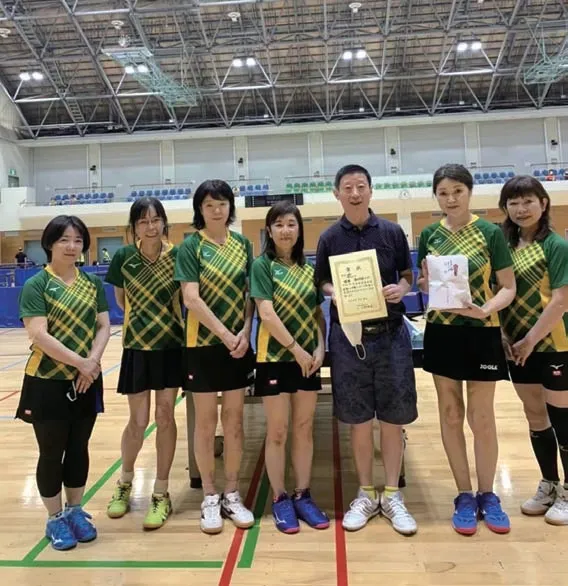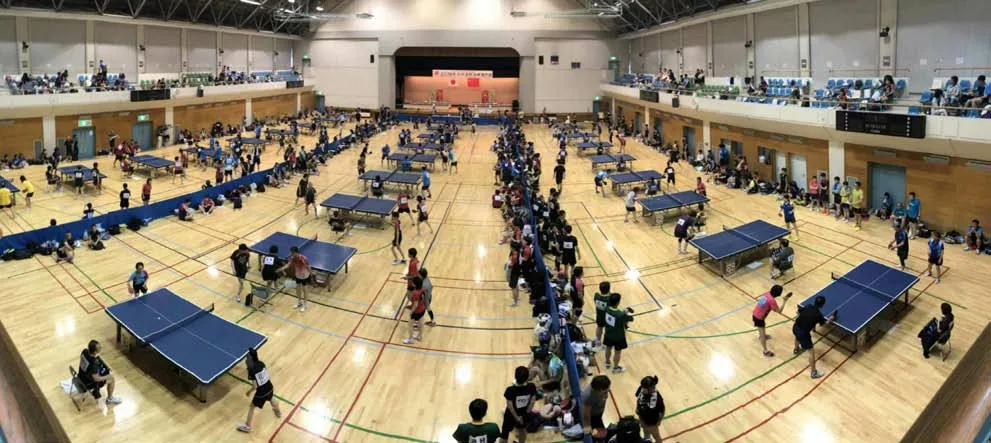邓荻:来自重庆的乒乓球使者
文/本刊记者 杨艳

Deng Di (third from the right) led his team to take part in a table tennis championship.邓荻(右三)带队参加乒乓球比赛。
Every day, many table tennis lovers practice hard and work up a sweat in the Kamata Table Tennis Club of Tamagawa,Ota-ku, Tokyo. The club is founded by Deng Di, a native of Chongqing.
Deng said, “Besides, we also have an individual training center in Kanagawa Prefecture. There are five teams at different levels in the club that usually participate in various games hosted by the Japan Table Tennis Association and local organizations. Most players in my club are table tennis fans with the respect for Chinese table tennis.”He has been driven by the “mission to promote table tennis” since he came to Japan.
The Table Tennis Club Run by a Chinese Being Popular
In 1963, Deng Di was born in Yuzhong District, Chongqing.Deng became a fan of table tennis when he was in elementary school.In 1974, he started to receive professional training. In 1978, he was a member of the provincial team in Sichuan. Then Deng Di took part in the national junior table tennis championship after one-year hard training, competing with Jiang Jialiang, the later world champion. Deng won the third place in the team game and earned the third-class merit in Sichuan Province. The Swedish national table tennis team came to China for a visit in 1982. In the China-Sweden table tennis game, Deng Di, representing the Chinese national team, competed with Waldner, the world superstar, and got a good score.
在日本东京大田区多摩川,有一家蒲田乒乓球俱乐部。每天都有一群乒乓球爱好者在这里挥汗如雨,勤奋练习。俱乐部的创办人叫邓荻,一个地道的重庆人。
“除大田区俱乐部外,我们在神奈川县还建立了个人培训中心。俱乐部有5个不同级别的球队,经常参加日本乒协和地方组织的各种比赛。来这里的大多是日本乒乓球爱好者,他们都带着对中国乒乓球的敬意而来。”邓荻说,从他到日本的那一天起,就一直坚持着推广乒乓球的“使命”。
中国人办的乒乓球俱乐部很有名气
1963年,邓荻出生在重庆市渝中区,小学时就喜欢上了乒乓球。1974年,他开始专业训练;1978年,进入四川省体工队。经过一年艰苦训练,邓荻参加了全国少年乒乓球赛,与后来的世界冠军江嘉良同台竞技,获得了团体组第三名,荣立四川省三等功;1982年,瑞典国家乒乓球队访问中国。在中瑞对抗赛中,邓荻代表国家队对阵世界名将瓦尔德内尔,获得一胜一负的好成绩。
In 1985, Deng retired from the national team. And he went to Chongqing University for study, during which he had an exchange visit to Japan, his first overseas trip.
In 1990, Deng Di, as the head coach of the Chongqing Hiroshima Team,led the team to participate in a table tennis game held in Japan with other teams from Chinese and Japanese sister cities. Following that, he was invited by the Hiroshima-City Table Tennis Association to give lectures at companies and schools in Tokyo and Hiroshima.
Deng Di was impressed by the Japanese people’s enthusiasm and positive climate in sports. In 1992, Deng went to Japan for study. He enrolled in Nippon Sport Science University with the major of sports psychology. In 1998, Deng chose to stay in Japan after graduation, as he said, “Japan needs high-level coaches.”
“To carry forward table tennis in Japan, an independent platform is a prerequisite.” In order to put his teaching philosophy and methods into better effect, Deng Di founded the Kamata Table Tennis Club in 2004. He has devoted himself to training those table tennis lovers for many years. The table tennis club run by a Chinese rose to a fame.
Deng Di has won five times in the Nissan Cup National Table Tennis Championship, a championship known by almost everyone in Japan, which brought him a growing number of table tennis followers. The club has more than 100 members until now, ranging from teenage students to octogenarians.
“Chinese table tennis players’ marvelous skills impressed us a lot.” Yoshida,a table tennis lover from Japan, is among those attracted by Chinese table tennis.In 2004, he found his weaknesses after a game against Deng Di, and has been Deng’s student for the next 12 years to hone his skills. Later, he became the two-time champion in community table tennis game.
1985年,他退役回到重庆,进入重庆大学学习。大学期间,邓荻第一次走出国门,就是赴日本交流访问。
1990年,邓荻以“重庆广岛队”总教练的身份,率队参加日本举行的中日友好城市组队的乒乓球赛。随后,广岛乒乓球协会邀请他到东京、广岛的企业、学校讲学。
日本人的热情好学和良好的体育氛围,给邓荻留下了深刻的印象。1992年,邓荻远赴日本学习,报考了日本体育大学,学习体育心理学。1998年,他毕业选择留在日本,他认为,“日本需要高水平教练。”
“要将乒乓球运动在日本发扬光大,必须要有自己的平台。”为了让自己的教学理念和方法得到更好的实践,2004年,邓荻创立了蒲田乒乓球俱乐部。多年来,他所有的精力都放在乒乓球爱好者训练上,这家中国人办的乒乓球俱乐部名气越来越大。
日本家喻户晓的日产杯全国乒乓球大赛,邓荻先后拿过5次冠军,这也让他的乒乓球追随者越来越多。俱乐部发展至今,拥有超过100名常年会员,小到十来岁的学生,上到八旬老人。

Members of Kamata Table Tennis Club Participating in the 2016 Japan-China Friendship Cup Table Tennis Game.莆田乒乓球俱乐部队员参加2016年日中友好杯乒乓球大会。
“中国乒乓球让我们大开眼界。”日本乒乓球爱好者吉田就是其中一位。2004年,他在与邓荻交手后发现自己的差距,跟着邓荻一学就是12年,后来他在社区乒乓球比赛中拿过两次冠军。
China-Japan Friendship Strengthened by Ping-Pong Games
Deng Di’s club is a magnet for both Japanese table tennis lovers and Chinese fans in Japan, including those from Chongqing. “After coming to Japan, I knew many friends from rounds of table tennis games. Apart from comparing notes, we also took the club as a platform for people of both countries to make acquaintance with each other, interact and cement our friendship.”
In May 2008, a middle school in Liangping District of Chongqing collapsed in Wenchuan Earthquake. Right after hearing the tragedy,members of the club raised money and donated it to the Foreign Affairs Office of Chongqing Municipal People’s Government, which was used for table tennis facilities and music classrooms in several schools of Liangping District.
As a Chinese poem goes, “While mountains and rivers separate us, we enjoy the same moonlight under the same sky.” In March 2011,a massive 8.8 magnitude earthquake struck Japan, shaking the Kanto region (including Tokyo) and the Tohoku region widely. Aftershocks arrived continuously and terrifying tsunami hit some areas, severely affecting air, land and sea transport and momentarily disrupting communications. Secondary disasters such as landslides and fires as well as casualties were reported frequently. The data showed that about 6.5 million people in Tokyo on that day were forced to stay and could not return home because of the traffic paralysis. Deng Di recalled that traffic disruptions in the Japanese metropolitan area caused by earthquake impeded a sea of people to get home, who had to cluster around the subway stations. In such a context, Deng Di provided free accommodations to the trapped club members, offering them assistance in time. “The Japanese trainees temporarily living in the club felt much more at ease, and they were very grateful for the help they received from the club. They left gradually till the traffic resumed to normal by degrees”, Deng Di said.
In 2014, The Japan-China Friendship Cup Table Tennis Game was hosted for the first time to celebrate the 10thanniversary of Kamata Table Tennis Club, participated by 80 teams and nearly 300 Chinese and Japanese athletes. In 2017 and 2018, with the support of the Chinese Embassy in Japan, the Japan-China Friendship Association,and the Ota City Government, two more Japan-China Friendship Cup Table Tennis Games were successfully held in succession. The one with the largest scale was attended by 112 teams and 600 athletes.The games paved the way for China-Japan friendly exchanges in table tennis and promoted the mutual understanding between both peoples.
“I hope more Japanese can boost China-Japan friendship through table tennis, and I also expect more Chongqing people in Japan join our family to unite as one with concerted efforts.” Although having become a permanent resident in Japan, Deng Di has no plan to immigrate to Japan. His permanent household registration is still in Yuzhong District, Chongqing, and his QQ nickname will always be“Chongqinger”.
Photos/The Interviewee
以球会友增进中日民间友谊
邓荻的俱乐部不仅吸引日本学员,也有很多在日本的中国乒乓球爱好者,以及重庆老乡,“来到日本后,我就以球会友。除了切磋球技,这里也成了中国人与日本人交友、交流,增进友谊的平台。”
2008年5月,汶川大地震,听说重庆梁平一所中学房屋倒塌。当天,大家筹得善款,立即转交到重庆市人民政府外事侨务办公室,用于梁平几所学校的乒乓球场地和音乐教室建设。
山川异域,风月同天。2011年3月,日本发生8.8级大地震,包括东京在内的关东地区、东北地区等大范围内均有强烈晃动。此后余震不断,部分地区发生大海啸,海陆空交通受到严重影响,通讯也一时中断。山体滑坡、火灾等次生灾害和人员伤亡报告不断。有数据显示,当天东京地区大约650万人因交通瘫痪而被迫滞留,无法回家。邓荻回忆,地震造成日本首都圈交通中断,城铁各站周边满是难以回家的人。他的俱乐部及时出手援助,向不能回家的日本学员开放,为他们免费提供住宿。“把俱乐部作为临时居所,在此避难的日本学员在一起感到安心多了,俱乐部的雪中送炭让他们十分感激。直到交通逐步恢复正常,学员们才有序离开。”邓荻说。
2014年为庆祝蒲田乒乓球俱乐部成立十周年,第一次举办了日中友好杯乒乓球大赛,有80个代表队近300名中日运动员参赛。2017年、2018年,在中国驻日本大使馆和日中友好协会,以及大田区政府的支持下,又连续成功举办了两届日中友好杯乒乓球大赛。最大规模有112个代表队、600名运动员参赛,为中日乒乓球友好交流搭建了更大的舞台,也让两国民众更加了解彼此。
“希望有更多的日本人通过乒乓球促进中日友好关系,也希望有更多在日本的重庆人加入到我们的大家庭,凝聚乡情,群策群力。”邓荻说,虽然他已经取得了在日的永久居住权,但他并没有考虑移民。他的户籍所在地仍在重庆市渝中区,他的QQ昵称永远都叫“重庆人”。

